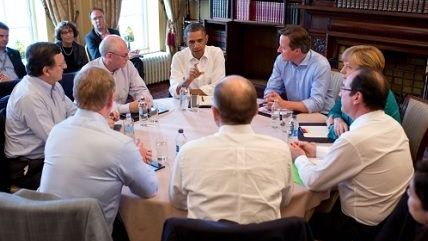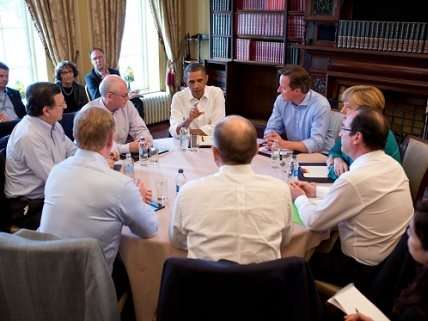Poll Shows Strong Non-Interventionist Mood Among American Public


A new Wall Street Journal/NBC News poll shows 47 percent of respondents saying the United States should be "less active" in global affairs. The Wall Street Journal describes the results as a "marked change from past decades," but the poll provides some data from previous decades, which may partially belie that notion.
The polls in 1995 and 1997 found 34 percent of Americans wanting the U.S. to be "less active" and, crucially, just 17 percent supporting the U.S. being "more active." This time, 19 percent of respondents wanted the U.S. more active. A plurality in the 1995 and 1997 polls (47 percent and 46 percent) thought the U.S. should continue its current level of activity.
The numbers did change rather drastically in the (presumably post-9/11) 2001 poll, which found 37 percent in support of the U.S. being more active and just 14 percent to be less active. Even then a plurality, 44 percent, believed the level of U.S. activity in global affairs was just right. After 13 years of escalating interventionism by the U.S. around the world (Iraq, and Afghanistan, and Pakistan, and Somalia, and Libya, and the rest of Africa, and the "Asia pivot"), it shouldn't be a surprise that supporting U.S. activity in global affairs at current levels finds the support of only 30 percent of respondents in the latest poll.
As I pointed out in my column yesterday, President Obama has been able to maneuver his foreign policy politically in such a way as to maintain the pillars of interventionism while reshaping the domestic perception of American activity abroad just enough to run as a kind of "anti-war" candidate not only in 2008 but in 2012. It appeared last summer he was ready to plunge into a military intervention in Syria, pulled back at the last minute by a John Kerry gaffe exploited for diplomatic purposes by Russia.
Other recent polls show the American non-interventionist mood extending to specific situations, which is not always so. A recent Reason poll found 58 percent of respondents wanting the U.S. to stay out of Ukraine altogether. The prospect of war in Syria wasn't popular last summer either; a Reason poll last year found 64 percent of respondents believing airstrikes in Syria were not necessary to protect U.S. interests. Nearly half believed the Washington political establishment wanted war more than they did. An ABC News/Washington Post poll last year found a record 67 percent of Americans believing the war in Afghanistan was not worth fighting. That war continues.
The Wall Street Journal also noted that its results crossed party lines: self-identified Democrats and Republicans want the U.S. less involved in global affairs. The last two times around, Democrats chose a candidate who talked peace but whose policies never matched and Republicans chose candidates who played into that narrative while trying to out-warmonger Obama. Non-interventionism ought to be popular on the campaign trail, although as the American electorate should know by now, given recent history, not every candidate vehicle will be authentic.
Editor's Note: As of February 29, 2024, commenting privileges on reason.com posts are limited to Reason Plus subscribers. Past commenters are grandfathered in for a temporary period. Subscribe here to preserve your ability to comment. Your Reason Plus subscription also gives you an ad-free version of reason.com, along with full access to the digital edition and archives of Reason magazine. We request that comments be civil and on-topic. We do not moderate or assume any responsibility for comments, which are owned by the readers who post them. Comments do not represent the views of reason.com or Reason Foundation. We reserve the right to delete any comment and ban commenters for any reason at any time. Comments may only be edited within 5 minutes of posting. Report abuses.
Please to post comments


"Non-interventionist mood..."
The irony is that this is probably what drives a lot of the foreign policy decision making in Washington.
"I don't really FEEL like invading Syria."
"I FEEL like we have to do something about Crimea."
Enough of this non-intervention bullshit. Dany, invade Westeros with your Dragons already!
I read the books...not a spoiler but it is looking more and more like Dany is not going to make it to Westeros...her dragons will though.
The "public" wants the US to be more interventionist...they just don't want it to fail at it. This is what these sad polls tell us.
Note: Yes i realize that according to Bo this makes me a neo-con...of course i want to dissolve nato and that according to him makes me a neo-con as well...pretty much saying anything makes you a neo-con.
No, we're "socons".
Neocons are Liberals by definition = they are just liberals with a hawkish foreign policy. They're "progressives with guns" who want to remake the world.
Bo, despite his pretentious twattery, is too young and ignorant to understand the difference. He knows only BOOOSH.
Heck, if you judge Republicans by Bush alone, you don't know them at all. Clinton was about as "Republican" as Bush, from 1994 to 2000.
yes; my point exactly.
I don't see where boots on the ground would've made much of a difference in any of the recent hotspots (Libya, Syria, Ukraine, etc.) but there are other ways of deterring tyrants besides shooting at them, and the current administration seems reluctant to do pretty much anything besides shaming them on twitter with nasty hashtags (seriously).
Reminds of the PJ O'Rourke in Peace Kills
""boots on the ground""
in an age of drone-strikes, JDAMs, and the diversity of JSOC assets, this term means nothing any more.
Which reminds me - when people say, "We have 'no military options'... I really want to ask them what the fuck they really mean by that, because what 'military options' entails now is not necessarily "DERP TANKS OVER THE BEACHES!!"
This time Athens will take Sicily. /Peloponnesian War
But will Hannibal make it to the gates of Rome this time?
They actually could have won, but they effed up. That's the key to winning--not fucking up.
When you throw around the term "Non-Interventionist" like its a *real thing* that both people and policy makers clearly define and which has a long track record as a guideline for international relations... then sure, you'll find it "everywhere".
The reality is that these polls don't say anything particularly interesting that hasn't been true for generations:
- Americans generally care much more about Domestic Policy versus Foreign Policy. Unsurprisingly, so do most populations around the world. How they express this may differ slightly, but the sentiment is consistent.
- Americans pay attention to Foreign Policy in very superficial ways; rarely are they particularly happy with whats going on and always think it could be 'done better or not done at all'.
- The terms 'intervention' versus 'non-intervention' would mean almost nothing to your average person. They want Both. If you follow the rhetorical history of how American presidential candidates talk about FP, you will find that the "Speak Softly, Carry Big Stick" combo is endlessly reiterated. "Humble, but Decisive and Committed" etc
run a poll asking if "America should 'disengage' with the world and refuse to take positions on security conflicts which do not directly affect US territory"... or any other *far more direct and explicit expression* of what 'non-intervention' really means in practical terms... THEN you might get results that tell you something useful.
I can't help but add another PJ quote after your comment Gilmore, because it echos your point so perfectly-
http://www.telegraph.co.uk/com.....olicy.html
"The object of waging a war is always to be in a better position in which to wage another war."
Americans feel how the media tells them to feel.
Why poll Americans? It isn't as though the government actually listens to them. For that, you have to pay.
Obama dithers on foreign policy matters because he can't actually focus on anything but himself. Making a decision on something that directly benefits him? No problem. Making a decision on something that doesn't? He can't do it. He doesn't get anyone else, only himself.
I had trouble trying to figure out 'The Obama Doctrine', until that popped into my head. Then, it all made sense. A situation pops up, 'how does this affect me?'. If it doesn't, then on what criteria should he base the decision?